unit2新起点大学英语 讲稿
- 格式:doc
- 大小:136.50 KB
- 文档页数:13
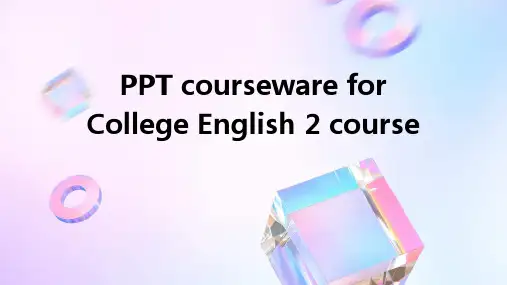

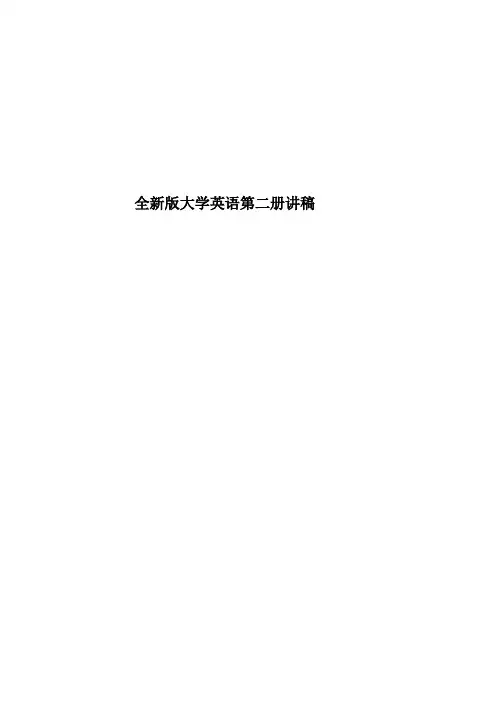
全新版大学英语第二册讲稿Unit oneWarm-up Questions1.If you find a two-year-old boy is trying to put a key into a box, will you help himimmediately?2.Can you recall how your parents taught you in your childhood? Did they like to teach you byholding your hand?3.Which way did you prefer when you were in trouble with one of your toys in yourchildhood, turning to your parents for help, or exploring by yourselves?Detailed ReadingⅠ. Difficult Sentences1. (LL. 13~15) Because of his tender age and incomplete understanding of the need to position the key just so, he would usually fail.Paraphrase the sentence.(= Because he was so young and didn’t quite know that he should position the key carefully to fit into the narrow key slot, he would usually fail.)2. (L. 15) Benjamin was not bothered in the least.1. Paraphrase the sentence.(= Benjamin was not bothered at all.)2.Translate the sentence into Chinese.(=本杰明一点也不在意。

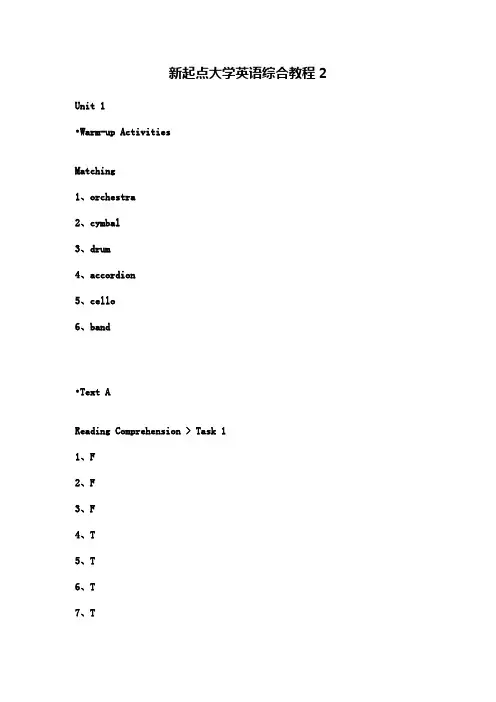
新起点大学英语综合教程2 Unit 1•Warm-up ActivitiesMatching1、orchestra2、cymbal3、drum4、accordion5、cello6、band•Text AReading Comprehension > Task 11、F2、F3、F4、T5、T6、T7、TReading Comprehension > Task 21、practice a lot2、bother other people3、sound cannot travel in space because there is no air4、a big glass ball connected to a machine which sucked out all the air inside5、proposed that she form part of a unique space journeyVocabulary & Structure > Task 11、e2、f3、g4、c5、d6、a7、b8、j9、h10、iVocabulary & Structure > Task 21、obstacle2、solution3、respectful4、crash5、achieved6、astronaut7、proposed8、bother9、documentary10、uniqueVocabulary & Structure > Task 3 1、musicmusicals2、slovesolution3、respectfulrespectable4、documentarydocument5、bother (v.)bother (n.)Vocabulary & Structure > Task 41、painful2、colorful3、helpful4、hopeful5、cheerfulVocabulary & Structure > Task 51、B2、C3、D4、C5、CVocabulary & Structure > Task 61、她知道敲击鼓钹的声音真的会使老人们心情烦躁。
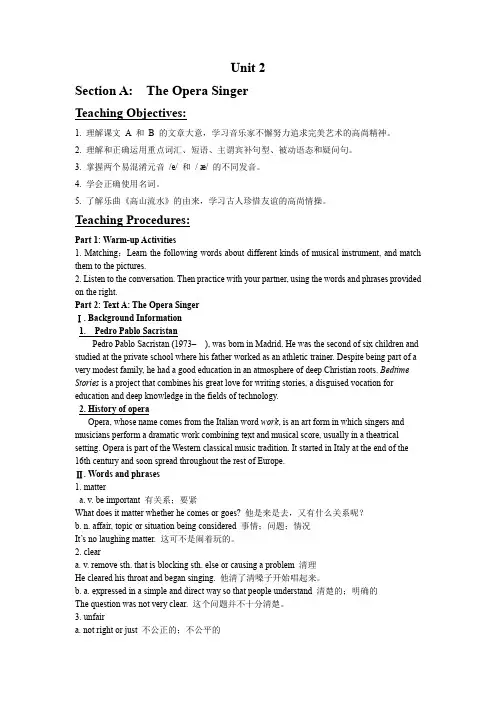
Unit 2Section A: The Opera SingerTeaching Objectives:1. 理解课文A 和B 的文章大意,学习音乐家不懈努力追求完美艺术的高尚精神。
2. 理解和正确运用重点词汇、短语、主谓宾补句型、被动语态和疑问句。
3. 掌握两个易混淆元音/e/ 和/ æ/ 的不同发音。
4. 学会正确使用名词。
5. 了解乐曲《高山流水》的由来,学习古人珍惜友谊的高尚情操。
Teaching Procedures:Part 1: Warm-up Activities1. Matching:Learn the following words about different kinds of musical instrument, and match them to the pictures.2. Listen to the conversation. Then practice with your partner, using the words and phrases provided on the right.Part 2: Text A: The Opera SingerⅠ. Background Information1. Pedro Pablo SacristanPedro Pablo Sacristan (1973– ), was born in Madrid. He was the second of six children and studied at the private school where his father worked as an athletic trainer. Despite being part of a very modest family, he had a good education in an atmosphere of deep Christian roots. Bedtime Stories is a project that combines his great love for writing stories, a disguised vocation for education and deep knowledge in the fields of technology.2. History of operaOpera, whose name comes from the Italian word work, is an art form in which singers and musicians perform a dramatic work combining text and musical score, usually in a theatrical setting. Opera is part of the Western classical music tradition. It started in Italy at the end of the 16th century and soon spread throughout the rest of Europe.Ⅱ. Words and phrases1. mattera. v. be important 有关系;要紧What does it matter whether he comes or goes? 他是来是去,又有什么关系呢?b. n. affair, topic or situation being considered 事情;问题;情况It’s no laughing matter. 这可不是闹着玩的。
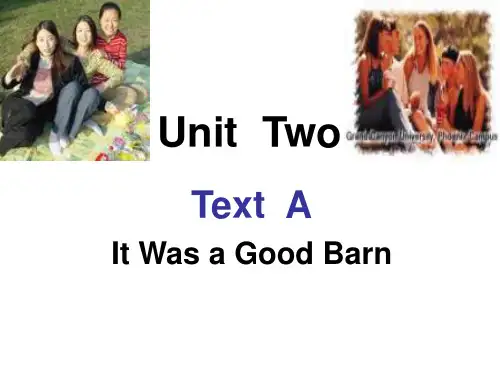
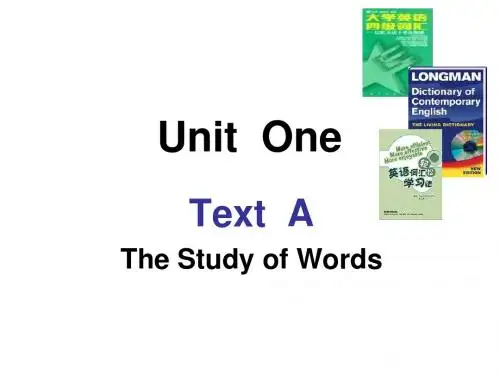
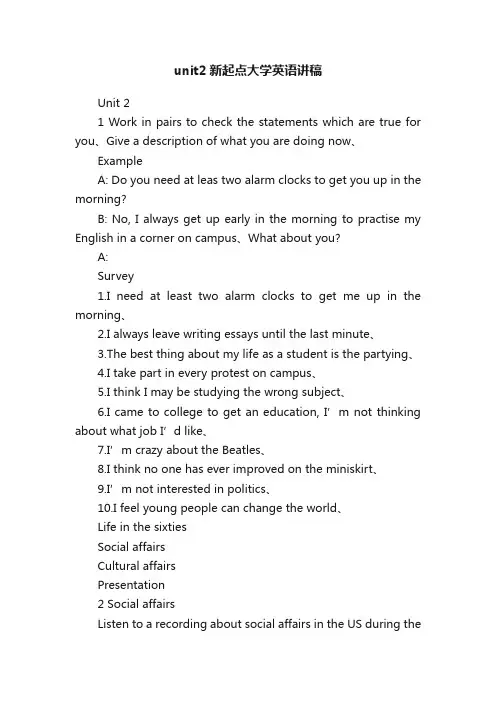
unit2新起点大学英语讲稿Unit 21 Work in pairs to check the statements which are true for you、Give a description of what you are doing now、ExampleA: Do you need at leas two alarm clocks to get you up in the morning?B: No, I always get up early in the morning to practise my English in a corner on campus、What about you?A:Survey1.I need at least two alarm clocks to get me up in the morning、2.I always leave writing essays until the last minute、3.The best thing about my life as a student is the partying、4.I take part in every protest on campus、5.I think I may be studying the wrong subject、6.I came to college to get an education, I’m not thinking about what job I’d like、7.I’m crazy about the Beatles、8.I think no one has ever improved on the miniskirt、9.I’m not interested in politics、10.I feel young people can change the world、Life in the sixtiesSocial affairsCultural affairsPresentation2 Social affairsListen to a recording about social affairs in the US during the1960s and plete the sentences、Social affairsThe 1960s began with the election of the first president born in the 20th century –John Kennedy、For many Americans, the young president was the symbol of a 1) ________ of hope for the nation、When Kennedy was murdered in 1963, many felt that their hopes died, too、This was especially true of young people, and members and supporters of 2) ________ groups、A time of 3) ____________ and hope soon began to look like a time of anger and violence、More Americans protested to demand an end to the 4) ________ treatment of black citizens、More protested to demand an end to the war in Vietnam、And more protested to demand full 5) ________ for women、By the middle of the 1960s, it had bee almost impossible for President Lyndon Johnson to leave the White House without facing 6) __________ against the war in Vietnam、In March of 1968, he announced that he would not run for another term、In addition to President John Kennedy, two other 7) ___________ leaders were murdered during the nineteen sixties、8) ________ rights leader Martin Luther King was shot in Memphis, Tennessee in 1968、Several weeks later, Robert Kennedy—John Kennedy’s brother—was shot in Los Angeles, California、He was campaigning to win his party’s 9) ____________ for president、Their deaths resulted in 10) _______ in cities across the country、3 Cultural affairsListen to recordings about cultural affairs in the US during the 1960s and finish the tasks、Bob Dylan 鲍勃·迪伦(美国民谣歌手、作曲家、诗人)Allen Ginsberg 艾伦·金斯堡(美国先锋派诗人)Timothy Leary 蒂莫西·李瑞(美国心理学家)4 Listen to Part I and answer the questions、1.What values did parents teach their children in the 1950s?A belief in God, hard work and service to their country、2、How did young people rebel against their parents?Letting their hair grow long and by wearing strange clothes、3、What were the main topics of Bob Dylan’s songs?Social unrest、4、What did “Do your own thing” mean?Do whatever you wanted, without feeling guilty、Listen to Part 2 and decide whether these statements are True or False、1 Hippies longed for more love and personal freedom in America、2 Timothy Leary urged young people to avoid drugs、3 People who use L-S-D see strange, colorful images、4 All the Americans got engaged into the social revolution、5 Women in the 1960s fought only for the same chances as men to get a good education and a good job、parisonWork in groups to discuss the topic、Based on what you’ve got about the life in the 1960s and life today, how do you think the life of young people has changed?In the 1960s, young people got themselves involved in seeking freedom and justice while young people today are mainly concerned about how to improve their chances of being petitive in the employment market、Text organizationRead the text quickly and fill in the flow chart to understandthe structure of the text、Text OrganizationTopicCollege: special?Students in the 1960sStudents todayConclusionCollege isn’t special any more、A general idea about college in the 1960sa place to experience exciting & stimulating lifeSupporting idea 1College: a place to fightfor freedom and justiceSupporting idea 2College: a place to taste real freedomA general idea about college todaya place which produces no passionSupporting idea 1College: a mere place to increase chances of getting a good jobSupporting idea 2College: a place not different from the real worldprehending the textWork in groups、Group 1 read Paras、1-4 to check the true statements about the 1960s、Group 2 read Paras、5-7 to check the true statements about the UK today、prehending the textGroup 1 read Paras、1-4 to check the true statements about the 1960s、1.students at the University of California, Berkeley did notprotest、2.students in Europe and the US spent a lot of time protesting、3.there was violence on university campuses in Europe、4.students and workers went on strike together in France、5.the UK Prime Minister had to resign because of student protests、6.students discovered a sense of freedom on campus、Group 2 read Paras、5-7 to check the true statements about the UK today、7.more young people than ever go to university、8.most students fail to plete their studies、9.international students are more interested in lifestyle than quality of courses、10.students need their parents for financial help、11.students don’t contact their parents as often as they used to、12.students don’t enjoy university life as much as they used to、Expressing contrasting informationWork in groups to find out examples of contrasting techniques in the text、“College isn’t special one” is an opinion piece ofwriting which discusses college life in the 60s and now、To express the idea that student life has changed, the author adopts the following 3 techniques:●Words suggesting the change●Questions●parative structureWords suggesting the change:These days political, social and creative awakening seems to happen not because of college, but in spite of it、Yet college education is no longer a topic of great national importance、Instead of the heady atmosphere of freedom which students in the 1960s discovered, students today are much more serious、Gone are the days when a son or daughter rang home once or twice a term、Questions:Where’s the passion today?What’s the matter with college?So why aren’t they true for the students of today?parative structure:Instead of the heady atmosphere of freedom which students in the 1960s discovered, students today are much more serious、In an uncertain world, many children re ly on their parents’ support much longer than they used to、Text evaluationWork in groups and discuss the questions, each group with one question only、1.What do you think is the purpose of a university education? Should it be an end in itselfor a means to an end?2.What factors influenced your choice of university and the course you are doing?3.If you had the chance to continue your studies abroad, what factors would influence yourchoice of destination?4.Why do young people protest more than old people?5.Do you think today’s young people in China are very different from the previousgenerations?SummarizingTalking pointEmployment opportunitiesStudent lifeSummarizingSummarize the text by filling the blanks、What are the most important issues for students today? Is the university 1) ________ really such a different place pared to what it was 40 years ago?For the students in the 1960s, going to college was the most 2) ________________________ experience of their life、They took part in 3) ________ and launched 4) _________ against the establishment with their new and 5) _____________ mitment to freedom and justice、Going to college also meant their first 6) ________ of real freedom、They could discuss the meaning of life, read their first 7) ____________ book and see their first indie film、SummarizingIn contrast, the students today don’t have the 8) _________ for college life that they used to、T oday, college is seen as a kind of small town from which people are 9) ________ to escape、Instead of the 10) ________ atmosphere of freedom which students in the 1960s discovered, students today are much more 11) __________、College has bee 12) ___________________, an opportunity to improve their 13) __________ of being petitive in the 14) ______________ market, and not an end 15) __________、But in spite of all this, the role of the university is the same as it always has been、It is the place where students have the 16) _____________ to learn to think for themselves、Employment opportunitiesForm groups of four、One student (Student A) in each group asks one question at a time to the group and otherstudents in the group give their answers to the questions one at a time、Student A summarize s the group’s main ideas and reports the summary to the class、Questions1.What contributes to the changes?2.What are the effects brought about by the changes?3.What should be done to meet the changes?Student lifeWork in groups、Choose one or two aspects of student life to talk about how student life is different from what you expected、These could include:intellectual developmentliving conditions including foodthe learning facilities such as libraries, labs and puter centres recreational and sports facilitiesthe roles of the student union and student societiesfinance and work opportunities etc、Difficult sentences1.“If you can remember anything about the 1960s, weren't really there,” so the saying goes、(Para 1)2.In the 1960s, California’s colleges and universities had transformed the state into theseventh largest economy、(Para 2)3.The liberals replied that it was the ability to tolerate noisy, dissident minorities whichmade universities great、(Para 2)4.Some people dro p out, but the most apathetic stay the course because it’s too much effortto leave、(Para 5)5、“Bliss was it in that dawn to be alive, But to be young was very heaven!” (Paras、8-9) Difficult sentence 1“If you can remember anything about the 1960s, weren't really there,” so the saying goes、(Para 1)1.What can we infer about the life of people in the 1960s?This saying makes a joking ment about these years: this was a time in the West when many young people took drugs (like cocaine, marijuana and LSD), so they were there and didn’t really remember much of what happened (because of the drugs, they were “in a haze of marijuana smoke”)、If someone does remember they weren’t really there—they must have been somewhere else, without drugs、2、Translate the sentence、有这么一种说法:“要就是您能记得20 世纪60 年代得任何事情,您就没有真正经历过那段岁月。
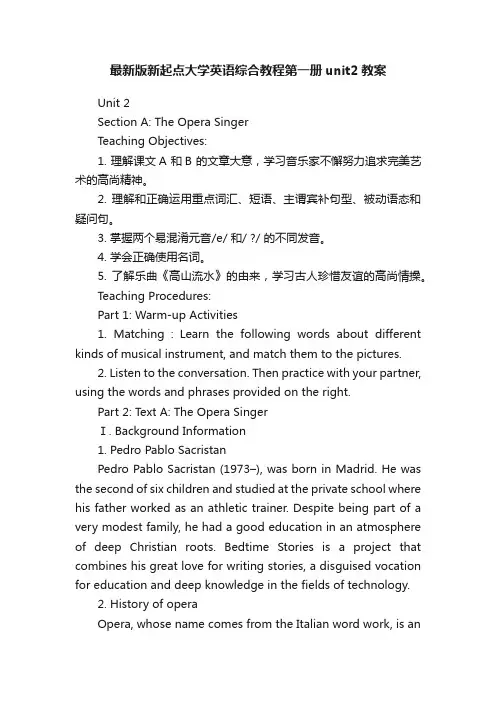
最新版新起点大学英语综合教程第一册unit2教案Unit 2Section A: The Opera SingerTeaching Objectives:1. 理解课文A 和B 的文章大意,学习音乐家不懈努力追求完美艺术的高尚精神。
2. 理解和正确运用重点词汇、短语、主谓宾补句型、被动语态和疑问句。
3. 掌握两个易混淆元音/e/ 和/ ?/ 的不同发音。
4. 学会正确使用名词。
5. 了解乐曲《高山流水》的由来,学习古人珍惜友谊的高尚情操。
Teaching Procedures:Part 1: Warm-up Activities1. Matching:Learn the following words about different kinds of musical instrument, and match them to the pictures.2. Listen to the conversation. Then practice with your partner, using the words and phrases provided on the right.Part 2: Text A: The Opera SingerⅠ. Background Information1. Pedro Pablo SacristanPedro Pablo Sacristan (1973–), was born in Madrid. He was the second of six children and studied at the private school where his father worked as an athletic trainer. Despite being part of a very modest family, he had a good education in an atmosphere of deep Christian roots. Bedtime Stories is a project that combines his great love for writing stories, a disguised vocation for education and deep knowledge in the fields of technology.2. History of operaOpera, whose name comes from the Italian word work, is anart form in which singers and musicians perform a dramatic work combining text and musical score, usually in a theatrical setting. Opera is part of the Western classical music tradition. It started in Italy at the end of the 16th century and soon spread throughout the rest of Europe.Ⅱ. Words and phrases1. mattera. v. be important 有关系;要紧What does it matter whether he comes or goes? 他是来是去,又有什么关系呢?b. n. affair, topic or situation being considered 事情;问题;情况It’s no laughing matter. 这可不是闹着玩的。
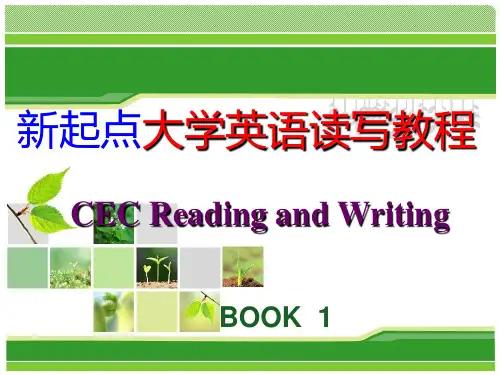
全新版大学英语2(第二版)UNIT2语言点教学文案全新版大学英语2(第二版)U N I T2语言点Unit 2 ValuesHappiness is not in the mere possession of money; it lies in the joy of achievement, in the thrill of creative effort.—— Franklin D. Roosevelt幸福不在于仅仅拥有金钱,而在于取得成就时的喜悦和创造性劳动带来的喜悦、激动。
———富兰克林·D·罗斯福Detailed ReadingⅠ. Difficult Sentences1. (LL. 1~2) It was early December 2003, my first season as a Salvation Army bell ringer,when I was confronted with the question.1. What does a Salvation Army bell ringer do?(=To ring the bell and ask people to donate money to help the poor.)2. Translate this sentence into Chinese.(=首次面对这个问题,是在2003年12月初我第一次为救世军摇铃募捐的时候。
)2. (LL. 5~6) I can still see the confusion and curiosity in his eye s as he asked, “Areyou poor?”1. Why did the boy ask such a question?(=Because he was confused and curious.)2. How much did the boy know about the Salvation Army bell ringer?(=Obviously he knew nothing about that.)3. (LL. 7~8) “Well,” I stammer e d, trying to think, “I havemore than some people, butnot as much as othe r.”1. How did the author think of the question?(=He thought it was difficult to answer.)2. What does the author’s answer mean?(=This means he is neither poor nor rich.)4. (LL. 8~9) His mother scolded him for the social no-no ...1. Wh at is “social no-no”?(=Something that is socially inappropriate.)2. Why did the mother scold her son?(=Because the author looked poor, the question was socially inappropriate toask.)5. (LL. 13~14) Yet I feel nothing more than a passing whim to attain the materialthings so many other people have.1. What do many other people have?(=The material things.)2. Please paraphrase this sentence.(=However, I have only occasionally felt the urge to go after the material things so many other people have.)6. (LL. 19~20) And I love the “can do” attitude that follows.1. Wh at is the “can do” attitude?(=That is self confidence.)2. How do you understand this sentence?(=And I love the feeling of self confidence brought by brisk exercises.)7. (L. 31) Shortly after her visit, our relationship went straight south.1. What was their relationship after her visit?(=Their relationship went sour. That is to say, they were no longer boyfriendand girlfriend.)2. Why there was such a change in their relationship?(=Because the girl actually paid much attention to material things although she claimed that she was interested in what was on the inside, and after she went to the aut hor’s apartment, she found he was really poor.)8. (LL. 35~38) There is a commercial on the radio that begins, “Everybody wants ahigh-end TV …” The pressure to purchase is real. It may be true that everybody wants a high-end TV. After all, nobody wants to be a nobody.1. What is “a high-end TV”?(=A TV that is expensive and of high quality.)2. What can be inferred from this part about what role commercials can play insociety?(=Commercials can put people under pressure to purchase more than is really necessary.)9. (L. 49) December is the time of year I feel wealthiest.Why does the author think so?(=Because December is the time for him to work for the Salvation Army as a bell ringer, which gives him a genuine sense of belonging and brings him happiness in helping others.)10. (LL. 50~51) Over the past four years, I’ve grown to understand more aboutmyself because of a single question from a curious child.1. How has the boy’s question affected the author?(=The boy’s question has helped him realize that, despitehis lack of expensive possessions, he is rich in many other ways and should be thankful for that.)2. Translate this sentence into Chinese.(=由于一个好奇的孩子提了一个简单问题,我在过去的四年中对自己的了解进了一步。
Book 2 Unit 2 Values(8 periods)Teaching Aims:Ss will be able to1. Understand the main idea (despite his wealth, Sam Walton remains down-home and devoted tohis team), then present our values in dealing with our world2. Appreciate the use of indirect description in portraying a person.3. Master key language points and grammatical structures in the textDifficult Points:1. Go further discussion about the theme of this unit--values2. Use indirect description to portray a person3. Language points and sentence patterns. (Ref. Language Learning)4. Long sentences.Teaching procedures:I. Lead-in1. One or two choices out of the six:A. Group discussion: What is the basic value for a college student? Or what kind of life do you desire to live?(T divides the whole class into several groups, and each group chooses a question as its topic for discussion, and then displays their results in English)B. Proverbs on values.C. Appreciation of the picture on the title page.(T encourages Ss to answer, and then gives comments)D. Listening to a song and then try to answer the questions given by text---part one.1).Who is it about?2).What happened to him one day?3).Do you think it was worthwhile to walk 2 or 3 miles to pay back the 6 and a quarter cents?4).Is the story related to the theme of the unit—values?(T lets Ss answer the questions, and gives the feedback to their answers.)E. Group discussion---Rich people I know(Before class, Ss are asked to collect stories or news reports of rich people. In class, Ss form groups of three to four to share what they have collected. Groups discuss what values these rich people hold dear. Speakers for several groups report their discussion results to the class. T reminds Ss to keep these values in mind when they study Text B, and see whether Sam Walton cherishes them or not.)F. (Practical version)Forbes is a kind of business magazine, which is famous for its ranking of the riches people in the world. According to the Forbes ranking in 2011, the three richest men are 卡洛斯.斯利姆(墨西哥电话公司)(535亿), Bill Gates(530亿), and 沃伦巴菲特(股神)(470亿)。
Unit 21 Work in pairs to check the statements which are true for you. Give a description of what you are doing now.ExampleA: Do you need at leas two alarm clocks to get you up in the morning?B: No, I always get up early in the morning to practise my English in a corner on campus. What about you?A:Survey1.I need at least two alarm clocks to get me up in the morning.2.I always leave writing essays until the last minute.3.The best thing about my life as a student is the partying.4.I take part in every protest on campus.5.I think I may be studying the wrong subject.6.I came to college to get an education, I’m not thinking about what job I’d like.7.I’m crazy about the Beatles.8.I think no one has ever improved on the miniskirt.9.I’m not interested in politics.10.I feel young people can change the world.Life in the sixtiesSocial affairsCultural affairsPresentation2 Social affairsListen to a recording about social affairs in the US during the 1960s and complete the sentences.Social affairsThe 1960s began with the election of the first president born in the 20th century –John Kennedy. For many Americans, the young president was the symbol of a 1) ________ of hope for the nation. When Kennedy was murdered in 1963, many felt that their hopes died, too. This was especially true of young people, and members and supporters of 2) ________ groups.A time of 3) ____________ and hope soon began to look like a time of anger and violence. More Americans protested to demand an end to the 4) ________ treatment of black citizens. More protested to demand an end to the war in Vietnam. And more protested to demand full 5) ________ for women.By the middle of the 1960s, it had become almost impossible for President Lyndon Johnson to leave the White House without facing 6) __________ against the war in Vietnam. In March of 1968, he announced that he would not run for another term.In addition to President John Kennedy, two other 7) ___________ leaders were murdered during the nineteen sixties. 8) ________ rights leader Martin Luther King was shot in Memphis, Tennessee in 1968. Several weeks later, Robert Kennedy—John Kennedy’sbrother—was shot in Los Angeles, California. He was campaigning to win his party’s 9) ____________ for president. Their deaths resulted in 10) _______ in cities across the country.3 Cultural affairsListen to recordings about cultural affairs in the US during the 1960s and finish the tasks. Bob Dylan 鲍勃·迪伦(美国民谣歌手、作曲家、诗人)Allen Ginsberg 艾伦·金斯堡(美国先锋派诗人)Timothy Leary 蒂莫西·瑞(美国心理学家)4 Listen to Part I and answer the questions.1.What values did parents teach their children in the 1950s?A belief in God, hard work and service to their country.2. How did young people rebel against their parents?Letting their hair grow long and by wearing strange clothes.3. What were the main topics of Bob Dylan’s songs?Social unrest.4. What did “Do your own thing” mean?Do whatever you wanted, without feeling guilty.Listen to Part 2 and decide whether these statements are True or False.☐ 1 Hippies longed for more love and personal freedom in America.☐ 2 Timothy Leary urged young people to avoid drugs.☐ 3 People who use L-S-D see strange, colorful images.☐ 4 All the Americans got engaged into the social revolution.☐ 5 Women in the 1960s fought only for the same chances as men to get a good education and a good job.ComparisonWork in groups to discuss the topic.Based on what you’ve got about the life in the 1960s and life today, how do you think the life of young people has changed?In the 1960s, young people got themselves involved in seeking freedom and justice while young people today are mainly concerned about how to improve their chances of being competitive in the employment market.Text organizationRead the text quickly and fill in the flow chart to understand the structure of the text.Text OrganizationTopicCollege: special?Students in the 1960sStudents todayConclusionCollege isn’t special any more.A general idea about college in the 1960sa place to experience exciting & stimulating lifeSupporting idea 1College: a place to fightfor freedom and justiceSupporting idea 2College: a place to taste real freedomA general idea about college todaya place which produces no passionSupporting idea 1College: a mere place to increase chances of getting a good jobSupporting idea 2College: a place not different from the real worldComprehending the textWork in groups. Group 1 read Paras. 1-4 to check the true statements about the 1960s. Group 2 read Paras. 5-7 to check the true statements about the UK today. Comprehending the textGroup 1 read Paras. 1-4 to check the true statements about the 1960s.1.students at the University of California, Berkeley did not protest.2.students in Europe and the US spent a lot of time protesting.3.there was violence on university campuses in Europe.4.students and workers went on strike together in France.5.the UK Prime Minister had to resign because of student protests.6.students discovered a sense of freedom on campus.Group 2 read Paras. 5-7 to check the true statements about the UK today.7.more young people than ever go to university.8.most students fail to complete their studies.9.international students are more interested in lifestyle than quality of courses.10.students need their parents for financial help.11.students don’t contact their parents as often as they used to.12.students don’t enjoy university life as much as they used to.Expressing contrasting informationWork in groups to find out examples of contrasting techniques in the text.“College isn’t special one” is an opinion piece ofwriting which discusses college life in the 60s and now.To express the idea that student life has changed, the author adopts the following 3 techniques:●Words suggesting the change●Questions●Comparative structureWords suggesting the change:These days political, social and creative awakening seems to happen not because of college, but in spite of it.Yet college education is no longer a topic of great national importance.Instead of the heady atmosphere of freedom which s tudents in the 1960s discovered, students today are much more serious.Gone are the days when a son or daughter rang home once or twice a term.Questions:Where’s the passion today?What’s the matter with college?So why aren’t they true for the students of today?Comparative structure:Instead of the heady atmosphere of freedom which students in the 1960s discovered, students today are much more serious.In an uncertain world, many children rely on their parents’ support much longer than they used to.Text evaluationWork in groups and discuss the questions, each group with one question only.1.What do you think is the purpose of a university education? Should it be an end initself or a means to an end?2.What factors influenced your choice of university and the course you are doing?3.If you had the chance to continue your studies abroad, what factors wouldinfluence your choice of destination?4.Why do young people protest more than old people?5.Do you think today’s young people in China are very different from the previousgenerations?SummarizingTalking pointEmployment opportunitiesStudent lifeSummarizingSummarize the text by filling the blanks.What are the most important issues for students today? Is the university 1) ________ really such a different place compared to what it was 40 years ago?For the students in the 1960s, going to college was the most 2) ________________________ experience of their life. They took part in 3) ________ and launched 4) _________ against the establishment with their new and 5) _____________ commitment to freedom and justice. Going to college also meant their first 6) ________ of real freedom. They could discuss the meaning of life, read their first 7) ____________ book and see their first indie film.SummarizingIn contrast, the students today don’t have the 8) _________ for college life that they used to. Today, college is seen as a kind of small town from which people are 9) ________ to escape. Instead of the 10) ________ atmosphere of freedom which students in the 1960s discovered, students today are much more 11) __________. College has become 12)___________________, an opportunity to improve their 13) __________ of being competitive in the 14) ______________ market, and not an end 15) __________.But in spite of all this, the role of the university is the same as it always has been. It is the place where students have the 16) _____________ to learn to think for themselves.Employment opportunitiesForm groups of four.One student (Student A) in each group asks one question at a time to the group and other students in the group give their answers to the questions one at a time.Student A summarizes the group’s main ideas and reports the summary to the class.Questions1.What contributes to the changes?2.What are the effects brought about by the changes?3.What should be done to meet the changes?Student lifeWork in groups. Choose one or two aspects of student life to talk about how student life is different from what you expected.These could include:intellectual developmentliving conditions including foodthe learning facilities such as libraries, labs and computer centresrecreational and sports facilitiesthe roles of the student union and student societiesfinance and work opportunities etc.Difficult sentences1.“If you can remember anything about the 1960s, weren't really there,”so thesaying goes. (Para 1)2.In the 1960s, California’s colleges and universities had transformed the state intothe seventh largest economy. (Para 2)3.The liberals replied that it was the ability to tolerate noisy, dissident minoritieswhich made universities great. (Para 2)4.Some people drop out, but the most apathetic stay the course because it’s toomuch effort to leave. (Para 5)5. “Bliss was it in that dawn to be alive, But to be young was very heaven!” (Paras. 8-9) Difficult sentence 1“If you can remember anything about the 1960s, weren't really there,” so the saying goes. (Para 1)1.What can we infer about the life of people in the 1960s?This saying makes a joking comment about these years: this was a time in the West when many young people took drugs (like cocaine, marijuana and LSD), so they were there and didn’t really remember much of what happened (because of the drugs, they were “in ahaze of marijuana smoke”). If someone does remember they weren’t really there—they must have been somewhere else, without drugs.2. Translate the sentence.有这么一种说法:“要是你能记得20 世纪60 年代的任何事情,你就没有真正经历过那段岁月。